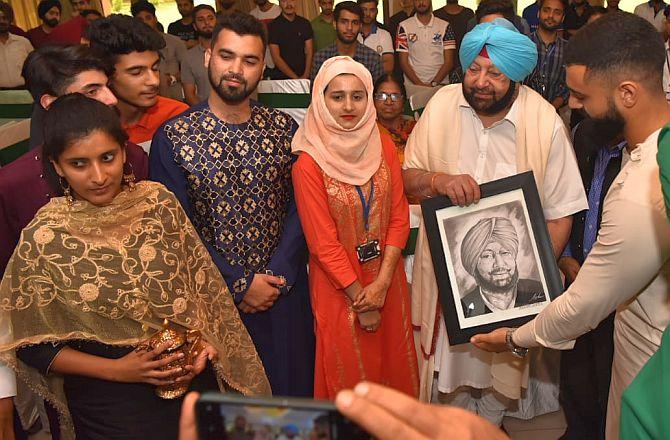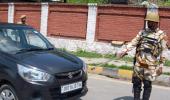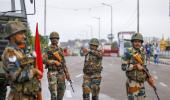'This is not a cricket match where one side lost and the other side won! We have not won a state or a war. Kashmiris are our own.'

Major Mohammed Ali Shah (retired) was posted at the Line of Control in 2003. Every time there was shelling on the LoC, the area would be covered with empty shells of spent cartridges.
After the shelling stopped, a young boy, about 10 years of age, would come and collect the shells.
The boy would do that every day.
One day, after he had collected the empty shells, Major Shah asked him what did he do with them.
The boy told him that he sold them in the scrap market and that’s how his household survived.
‘Why don’t you go to school?’ he asked, and the boy said he did not have the means or the resources or the guidance.
Drawing from his own tenure in the J&K and the north east, Major Shah, who took early retirement, feels the best way forward in Kashmir is education -- and in conveying to the Kashmiris that they are one of us, and we are one of them.
“Hum sab ek hain. If we stand tall, if we stand united, if we stand educated -- we will not need any special privilege or power. Kashmir has seen enough bloodshed. Now let’s give peace a chance.”
The son of Lieutenant General Zameer Uddin Shah, who retired as deputy chief of army staff after four decades in the Indian Army, Major Shah wrote an open letter to fellow Indians after the abrogation of Article 370.
‘The onus is on us as a nation to prove that this historical move works in the best interests of the nation as a whole,’ he wrote.
“This is not a cricket match where one side lost and the other side won! Even if it is a welcome step, we have not won a state or a war. Kashmiris are our own, we must be sensitive and must all remain united,” he tells Rediff.com’s Archana Masih.
On what is the way forward in Kashmir
Education.
Instead of guns, the youth should have books and laptops.
There will be legal repercussions to the abrogation of Article 370 and Kashmiris will move the courts, but what if the courts rule against them?
Today there is a communication blackout in Kashmir, so either I choose to curse the darkness or I choose to light a candle.
If we stand tall, if we stand united, if we stand educated, we will not need any special privilege or power.
Kashmir has seen enough bloodshed. Kashmiris are our own people. They are not our external enemy.
Kashmiris should also realise that they have been pelting stones at the security forces and perceiving us as villains.
The army is there to protect them. To fight the enemy that has come from across.
We talk of the human rights of locals, yes, very well, humanity comes first, but we also need to think of the human rights of soldiers and their families.
After my J&K tenure, I was posted in Kohima and at the World War cemetery there were engraved these words: ‘When you go home, tell them of us and say, for your tomorrow, we gave our today’ -- that sums up the life of a soldier.
The rest of India’s responsibility towards Kashmiris
We should not joke around saying we can buy land in Kashmir, marry Kashmiri girls -- this is not a cricket match that one side won and the other side lost!
Many people celebrated the abrogation with crackers. Even if it is a welcome step, bursting crackers doesn’t look good. It gives the impression as if we have conquered a land or won a war.
They are our own people -- we must be sensitive and deal with this maturely.
We should understand that it is in the best interest of the nation and empathise with Kashmiris because no one likes to be under a clampdown on a festival.
We also have to alter our attitude towards people from the north-east. The rest of India treats them differently because they look different.
We need to tell them that we are with you, and they are no different than us.
We are a salad bowl nation, not a melting pot.
What after the clampdown is lifted
I hope there is no trouble, especially bloodshed.
I hope the stone pelters do not cause casualty to our troops and our troops do not cause casualty to them, no matter what the provocation.
Without going into whether revoking Article 370 was right or wrong, I want to say that two wrongs do not make a right.
Violence is not the answer, let’s give peace a chance.
We have to stand united. We have to convey the message that this step has been taken not to clamp you down, but integrate you.
To make you feel one of us, to make us feel one of you. Hum sab ek hain. We have to extend support to the armed forces and to the locals.
Kashmir belongs to Kashmiris -- Muslims, Pandits, Dogras.
Pandits were driven out overnight, imagine what must they must have gone through.
It takes time to fill any wound. Any genocide, be it of Kashmiri Pandits, or lynchings or Partition -- it takes four generations to forget.
The ethos of the Indian Army
The Indian Army is a secular and fair organisation.
In my experience of having served in J&K, we did our best to win the hearts and minds of people.
The army has conducted so many camps and taken the responsibility of educating many Kashmiris. They have brought Kashmiris to other parts of India.
During the Kashmir floods of 2014, the army did fantastic work. They even built human bridges, where jawans actually stepped into the water and formed a bridge with their own bodies so that civilians could step on them and pass through.
When people allege human rights violations by the army, I want people to know that there is a lot of scrutiny and surveillance of army personnel.
You are watched by senior officers and you have to be accountable to your own men.
There are aberrations like Major Gogoi who strapped a civilian to a jeep, but that does not mean that the army is indulging in human rights violations.
The ethos of the army is that no innocent should be harmed, but the guilty should not be spared.
On the use of pellet guns in Kashmir
Despite the fact that I am from the Forces, as a former soldier, I advocate using permanent ink guns which have been used in the north-east in the past.
My father [Lieutenant General Zameer Uddin Shah] employed them while serving in the north-east and has written about it.
My father was part of the army fighting the Punjab militancy and with the efforts of the security forces, a solution was found.
India found a solution in Assam -- why can’t we find a solution to Kashmir?
There are two things happening in Kashmir -- the misuse of money and misuse of religion.
Youngsters are being brainwashed and being told that you will attain paradise if you sacrifice your life, which is rubbish.
If Kashmiris want to protest against Article 370, a silent peace protest is fine, but the moment the protest turns violent, innocent people lose lives and the blame game begins.
The government’s action must have been carefully thought of and executed.
We have been trying to finish insurgency in Kashmir for a long time. It has to be treated very tactically.
Let us give peace a chance and let us have a measured response because else there will be no end to this bloodshed.










